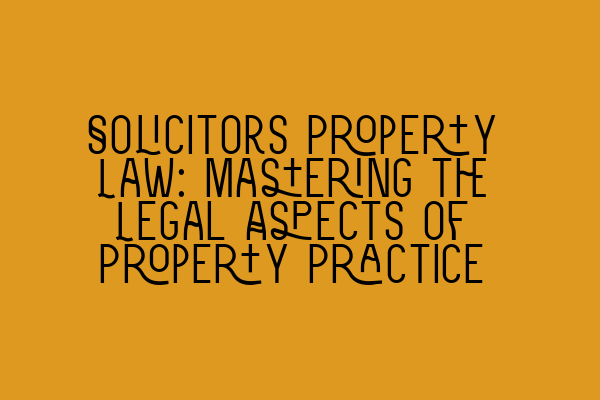Solicitors Property Law: Mastering the Legal Aspects of Property Practice
As a solicitor specializing in property law, it is crucial that you possess a deep understanding of the legal aspects of property practice. From conveyancing to landlord and tenant issues, having a solid foundation in property law is essential to provide the best legal advice and representation to your clients.
In this blog post, we will explore the key areas of property law that solicitors must master to excel in their practice. Whether you are a beginner starting your journey into property law or an experienced practitioner looking to enhance your knowledge, this guide will serve as a valuable resource.
Understanding Conveyancing
One of the fundamental aspects of property law is conveyancing – the process of transferring legal ownership of a property from one party to another. From drafting contracts to conducting property searches and dealing with mortgages, conveyancing requires meticulous attention to detail and in-depth knowledge of property law and land registration.
To excel in conveyancing, solicitors must be well-versed in the Land Registration Act 2002, as well as relevant regulations and case law. Understanding the intricacies of property transactions and ensuring compliance with legal requirements is essential to protect your clients’ interests.
For practice questions on conveyancing and other property law topics, be sure to check out our SQE 1 Practice Exam Questions.
Mastering Landlord and Tenant Law
Landlord and tenant law is another crucial area of property practice that solicitors must be well-versed in. From advising landlords on their legal obligations to assisting tenants with their rights, understanding the complexities of this area of law is essential to provide effective legal representation.
Having a thorough knowledge of relevant legislation, such as the Landlord and Tenant Act 1985 and the Housing Act 2004, will allow you to navigate the intricacies of tenancy agreements, rent arrears, eviction proceedings, and other landlord and tenant matters.
For mock exams and quizzes to test and improve your understanding of landlord and tenant law, visit our SQE 1 Practice Mocks FLK1 FLK2 page.
Exploring Leasehold and Freehold Interests
Another area of property law that requires a high level of expertise is leasehold and freehold interests. Understanding the rights and obligations of leaseholders and freeholders is crucial when dealing with properties that are subject to long-term leases or owned outright.
From advising clients on lease extensions and enfranchisement to handling disputes arising from leasehold agreements, having a solid understanding of leasehold and freehold interests is vital in protecting your clients’ assets and interests.
If you are looking to enhance your knowledge of leasehold and freehold matters, consider enrolling in our SQE 2 Preparation Courses.
Staying Up-to-Date with Changing Regulations
In the dynamic field of property law, it is crucial for solicitors to stay abreast of changing regulations and legislation. The law surrounding property matters is constantly evolving, and failing to keep up with these changes can have potentially serious ramifications for both you and your clients.
By regularly attending seminars, workshops, and training sessions, you can ensure that you are up-to-date with the latest developments in property law. Additionally, staying connected with professional networks and reading relevant legal publications can provide valuable insights into emerging trends and best practices in the field.
For important dates related to the SRA SQE exams and other helpful resources, please visit our page on SRA SQE Exam Dates.
Conclusion
Mastering the legal aspects of property practice is crucial for solicitors specializing in property law. From understanding the intricacies of conveyancing to navigating landlord and tenant disputes, having a comprehensive knowledge of property law is essential to provide top-notch legal representation to clients.
By staying up-to-date with changing regulations, enrolling in relevant courses, and regularly practicing and testing your knowledge, you can ensure that you are well-prepared to tackle the challenges of property law and excel in your career as a property solicitor.
